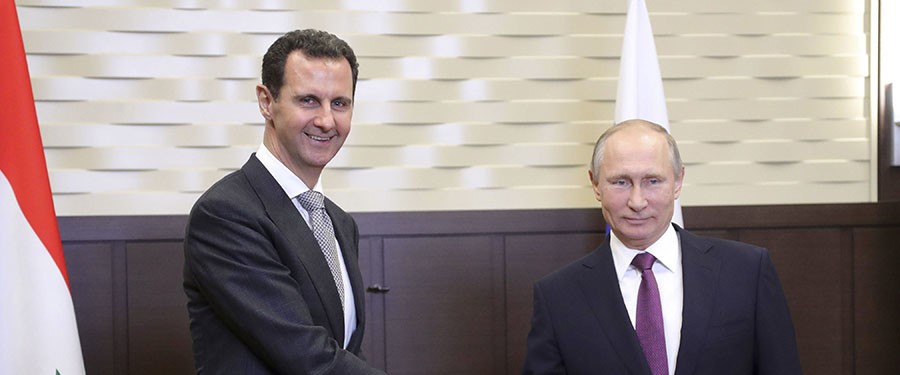Russia’s plans for Syria
April 27, 2018 | Expert Insights

Russia may be preparing to deliver the Syrian government with its sophisticated air defence system. This comes during a period of heightened violence in the region and just weeks after the US, UK and France coordinated missile strikes on the country.
Background
Russia has supported the internationally recognized government of Syria since the beginning of the Syrian conflict in 2011 - politically, with military aid, and since 30th September 2015 also through direct military involvement. The latter marked the first time since the end of the Cold War that Russia entered an armed conflict outside the borders of the former Soviet Union.
The Syrian government has often been accused of conducting chemical warfare against its own citizens in rebel regions. In April 2017, news emerged of an alleged chemical attack on a rebel-held Syrian town. At least 74 people, including 11 children, were killed in Khan Sheikhoun, Idlib province. The attack was the deadliest use of chemical weapons in the Syrian civil war since the Ghouta chemical attack in 2013.
The international community including the governments of United States, United Kingdom, Turkey, Saudi Arabia, France, and Israel, as well as Human Rights Watch have attributed the attack to the forces of Syrian President Bashar al-Assad. This is a charge that the Syrian government has vehemently denied. The attack resulted in the complete dissolution of a working relationship between the US and Syrian government.
Russia however, has long supported Syria against such accusations in the United Nations. On 9th September 2013, responding to U.S. threats of strikes against Syria in response to the use of chemical weapons in Syria, Russian Foreign Minister Sergey Lavrov issued a proposal intended to avert a U.S. attack, with provisions including Syria's placing its chemical weapons under international control and their subsequent destruction. In October 2017, Russia opposed renewing the mandate of the joint UN-Organisation for the Prohibition of Chemical Weapons (OPCW) panel before it released a report on a sarin gas attack in Khan Sheikhun.
Analysis
In April 2018, it was reported that at least 42 people in Douma, Syria died due to an alleged chemical attack. The US government has blamed the official Syrian government of orchestrating this attack against its civilians. As a result, US, UK and France initiated air strikes on Syrian soil. Russia has responded aggressively to action against Syria. Russia's U.N. Ambassador Vassily Nebenzia had warned western allies against taking any military action. He stated that if these countries did not refrain from taking military action in Syria, then he would not “exclude war” between America and Russia.
Now, news has emerged that Russian is possibly willing to supply the Syrian military with a sophisticated air defence system to counter any airborne threats. According to Kommersant, a top Russian newspaper, the nation is planning to deliver its S-300 missile defence system. However, Russian Foreign Minister Sergey Lavrov has called such reports premature. "We'll have to wait to see what specific decisions the Russian leadership and representatives of Syria will take," Lavrov was quoted as saying by Russia's TASS news agency. "There is probably no secret about this, and it can all be announced [if a decision is taken]".
The report comes when Israeli defence minister Avigdor Lieberman noted that Tel Aviv was willing to strike the S-300 anti-aircraft defence system if it is "used against" it. He said, “One thing should be clear - if someone fires on our planes, we will destroy them. What's important to us is that the weapons defense systems that the Russians transfer to Syria are not used against us. If they are used against us, we will act against them.
Russia has been unwavering in its support to Syria through the years. It has provided both military support and has supported the Assad regime despite pushback from the UN. This could partly be because Russia is looking to increase its influence in Middle East. It is also seeking to rebuild its naval presence around the world. In December 2017 news emerged that Putin called on lawmakers to ratify a deal to expand a military port in Syria and keep forces there for another 50 years. This base is incredibly important to the Kremlin with regards to its ambitions in Middle East.
Assessment
Our assessment is that Russia has already signaled that it was willing to enter military conflict with the US and its allies over Syria. This is part of Russia’s grand ambitions to increase its influence in the Middle East and expand its naval base to what it used to be during the Soviet Union era. It is evident by the fact that Putin called on lawmakers to ratify a deal to expand the naval port in Syria. This, however, puts the Kremlin on a direct collision course with not only the US but also nations like Israel, UK and France. As violence escalates in the region, it remains to be seen if diplomacy could ultimately broker peace in Syria.








Comments